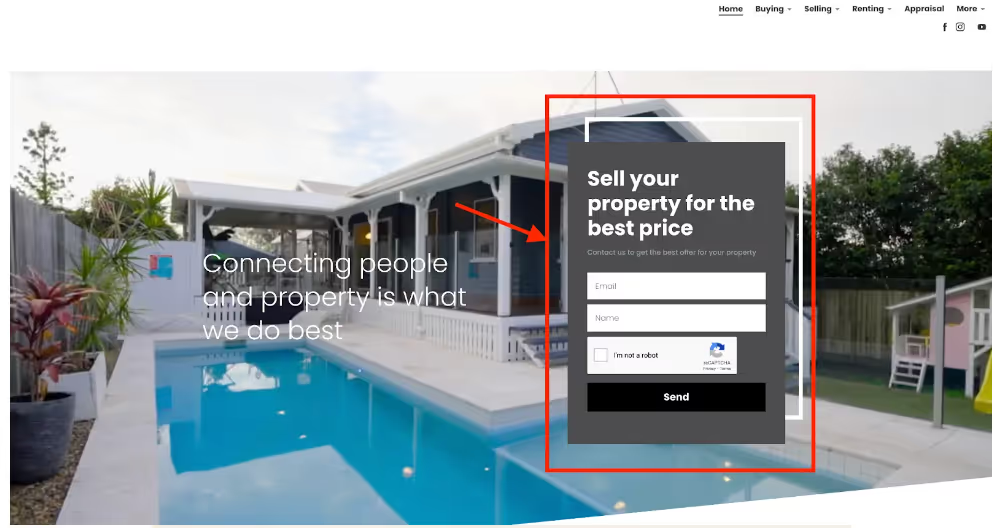
You’ve built a reputation through effort, expertise, and knowing your patch better than anyone else. Whether it’s knocking on doors, mastering the art of negotiation, or staying ahead of market trends, you’ve done it the right way—your way. So why should your website be any different? The digital world isn’t some mystery you have to unravel; it’s just another tool in your kit, another avenue for growing your business in ways that complement what you’re already doing.
Think of your website as an extra pair of hands—a tireless assistant working 24/7, converting the effort you’ve put into building relationships and closing deals into a steady stream of new leads. Here are 12 straightforward ways to supercharge your estate agent website and ensure it’s doing as much work for you as you are.
1. Keep Your Google Business Profile Updated
You wouldn’t let the sign outside your office fade, and you wouldn’t give out business cards with outdated details. Your Google Business Profile is no different. When a potential client looks you up, your profile is often their first introduction. Keeping it accurate and up to date ensures they find you easily and trust what they see.
Real-world parallel: Think of your Google Business Profile as your digital shopfront. If a passerby can’t find your address, or your opening hours are incorrect, they’re unlikely to stop by. Keep it fresh, just like you would your office.
2. Optimise for Search Engines

When someone is looking for an estate agent, they start by asking Google. Whether they’re searching for “best estate agent in [location]” or “houses for sale near me,” it’s your name that should be at the top. Ranking higher isn’t about gaming the system—it’s about ensuring that when potential clients are looking, they find you. A study by Zero Limit Web shows that nearly 70% of all clicks go to the first five organic search results, meaning optimising your website for a high ranking is critical if you want to attract more website traffic without having to rely on paid sources.
Real-world parallel: Imagine you’ve got the best corner spot in town for foot traffic. Optimising your site for search engines is the digital equivalent. It ensures that when people are “walking” down the digital high street, your door is the first they see.
For SEO optimisation activities we have an ultimate guide to SEO for estate agents.
3. Optimise for Mobile Users
Just as you’d ensure your office is accessible, your website needs to be fully functional for clients browsing on their phones. More than half of all property searches happen on mobile devices, so if your site doesn’t load properly or is difficult to navigate, you’re essentially leaving the door shut to a significant portion of your market. Not only this but Google prioritises mobile-first indexing effectively promoting web content that works well on mobile devices.
Real-world parallel: Think of your mobile site as a virtual open house. It needs to be welcoming, clean, and easy to move through, whether someone is popping in during a lunch break or browsing late at night from their sofa.
4. Simplify Website Navigation
The way you guide someone through a property viewing should mirror how your website leads visitors to key information. Whether they’re looking for property listings, valuations, or contact details, your website should be as intuitive as walking through a house where each room naturally leads to the next. If it’s hard to find, they’ll lose interest.

Real-world parallel: Imagine showing a house where the rooms are arranged in a confusing layout. You wouldn’t expect clients to see the potential, and the same goes for your website. Clean, simple navigation ensures visitors find what they’re looking for without the frustration.
5. Tailor Your Website Copy to Your Ideal Client
When you’re pitching to a potential seller or buyer, you tailor your language to meet their needs, whether they’re upsizing, downsizing, or investing. Your website copy should work the same way. It’s about understanding who your ideal clients are and speaking directly to their challenges and goals, so when they read your content, they feel like you’re speaking to them personally.
Real-world parallel: Think of website copy as your sales pitch. It should reflect your expertise and empathy—just like you wouldn’t give the same pitch to a first-time buyer as you would to a seasoned investor.
6. Use Clear Calls to Action (CTAs)
When you’re closing a deal, you know the importance of a strong, clear next step. Your website needs to guide visitors in the same way—whether it’s booking a valuation, registering interest in a property, or signing up for updates. Make sure your calls to action are prominent and direct, so there’s no confusion about what they should do next.

Real-world parallel: Imagine walking a client through the final stages of a sale but never actually asking them to sign the contract. Clear calls to action are your digital way of sealing the deal.
7. Embrace Multimedia to Showcase Listings
Just like staging a home or creating a standout brochure, using high-quality images, videos, and virtual tours on your website can make all the difference in how clients perceive a property. These tools help clients visualise themselves in the space, even before stepping foot through the door.

Real-world parallel: Think of this as your digital home staging. Just as you’d invest in professional photography for a brochure, the same effort should go into your website to give listings that polished, irresistible appeal.
8. Use Articles and Profiles to Build Trust

You know your market better than anyone—so why not share that knowledge? By creating valuable content, like articles on local property trends or profiles on neighbourhoods, you establish yourself as the expert. It’s like offering a mini-consultation through your website, showing potential clients you’re the authority they can trust.
When creating articles for your website consider the AIM framework which focuses on 3 things:
- Who is your Audience? Build buyer personas for your ideal customers, and keep it top-of-mind with all your website copy. Here are a few questions to ask yourself when defining your audience:
- What challenges are your prospects facing?
- What are your prospects trying to achieve?
- Which channels are your prospects turning to in order to find the information they’re looking for?
- What is your Intent? Your intent should never be simply to inform. You should be trying to motivate and inspire your prospects to take some sort of action. Questions to ask yourself to define the intent of your content:some text
- What is it exactly that you want your audience to do with your recommendations?
- What are the concrete next steps?
- Who should complete certain actions? By when?
- What is your Message? It’s time to craft your message only after you’ve completed the previous two steps. It should strike the right balance between your audience’s pain points and your business goals. A great message will be brief, memorable, repeatable, emotional and data-backed
Real-world parallel: Think of these articles as your way of chatting with clients at a networking event, sharing insights that demonstrate your expertise and encourage them to work with you.
9. Retarget Website Visitors with Personalised Ads
If someone visits your website and doesn’t immediately get in touch, it doesn’t mean they’re not interested. Retargeting ads let you stay on their radar by showing them properties or services they’ve already expressed interest in. It’s like sending a gentle reminder that you’re still here, ready to help when they’re ready to make their move.

Real-world parallel: It’s akin to following up with a client who attended an open house but didn’t make an offer straight away. You’re reminding them that the property—and your services—are still available.
10. Personalise Lead Nurture Efforts
Every client is unique, and your digital approach should reflect that. Use data from your website to segment your leads and deliver personalised messages based on their behaviour. If someone is consistently looking at properties in a certain price range, follow up with similar listings to keep them engaged.
Real-world parallel: Just as you’d adjust your recommendations based on what a client has told you during a conversation, personalised lead nurture adapts to what your clients are telling you with their actions online.
11. Highlight Client Testimonials
Word of mouth has always been a cornerstone of your success, and online testimonials are no different. Showcasing positive reviews from satisfied clients can provide that extra push for someone who’s on the fence about working with you. Make these testimonials a prominent feature on your website to build trust instantly.

Real-world parallel: It’s like having a satisfied client personally recommend you to a friend—it’s the credibility boost that can make all the difference.
12. Manage Negative Reviews Professionally
Every agent has dealt with difficult clients, but how you handle those challenges says a lot about your professionalism. The same goes for negative reviews. Address them head-on, offer solutions, and demonstrate your commitment to resolving issues. This can turn a potential deal-breaker into an opportunity to show new clients how you handle adversity with grace.
Real-world parallel: Think of this as managing a tricky negotiation with transparency and professionalism. The way you respond to challenges can either build or damage your reputation, so handle online feedback as carefully as you would a high-stakes deal.
Enhance Your Website to Boost Leads
Your estate agent website is more than just an online brochure—it’s a key part of your lead generation strategy. By implementing these 12 tactics, you can ensure that your website works as hard as you do, bringing in more clients while you focus on what you do best: selling properties. It’s not about changing the way you work, but enhancing it with the tools of the digital age.
At Rex Software, we specialise in building websites that don’t just look good but work hard for your business. Get in touch today to learn how we can help your estate agency generate more leads and close more deals.







